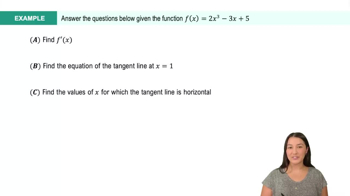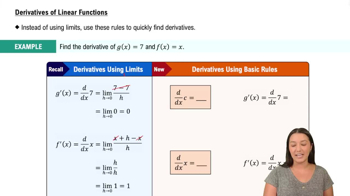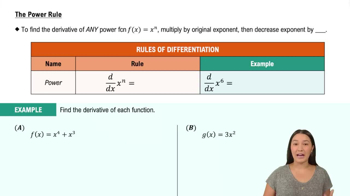Table of contents
- 0. Functions7h 52m
- Introduction to Functions16m
- Piecewise Functions10m
- Properties of Functions9m
- Common Functions1h 8m
- Transformations5m
- Combining Functions27m
- Exponent rules32m
- Exponential Functions28m
- Logarithmic Functions24m
- Properties of Logarithms34m
- Exponential & Logarithmic Equations35m
- Introduction to Trigonometric Functions38m
- Graphs of Trigonometric Functions44m
- Trigonometric Identities47m
- Inverse Trigonometric Functions48m
- 1. Limits and Continuity2h 2m
- 2. Intro to Derivatives1h 33m
- 3. Techniques of Differentiation3h 18m
- 4. Applications of Derivatives2h 38m
- 5. Graphical Applications of Derivatives6h 2m
- 6. Derivatives of Inverse, Exponential, & Logarithmic Functions2h 37m
- 7. Antiderivatives & Indefinite Integrals1h 26m
3. Techniques of Differentiation
Basic Rules of Differentiation
Problem 3.4.59
Textbook Question
Find and simplify the derivative of the following functions.
f(x) = √(e2x + 8x2ex +16x4) (Hint: Factor the function under the square root first.)
 Verified step by step guidance
Verified step by step guidance1
Step 1: Recognize that the function f(x) = \sqrt{e^{2x} + 8x^2e^x + 16x^4} is a composition of functions, where the outer function is the square root and the inner function is a polynomial expression. To simplify the differentiation process, factor the expression under the square root.
Step 2: Notice that the expression under the square root, e^{2x} + 8x^2e^x + 16x^4, can be factored. Look for a common factor or a pattern that resembles a perfect square trinomial. In this case, it can be factored as (e^x + 4x^2)^2.
Step 3: Substitute the factored form back into the original function: f(x) = \sqrt{(e^x + 4x^2)^2}. The square root and the square cancel each other out, simplifying the function to f(x) = e^x + 4x^2.
Step 4: Differentiate the simplified function f(x) = e^x + 4x^2. Use the sum rule of differentiation, which states that the derivative of a sum is the sum of the derivatives. Differentiate each term separately: the derivative of e^x is e^x, and the derivative of 4x^2 is 8x.
Step 5: Combine the derivatives of each term to find the derivative of the entire function: f'(x) = e^x + 8x. This is the simplified derivative of the original function.
Recommended similar problem, with video answer:
 Verified Solution
Verified SolutionThis video solution was recommended by our tutors as helpful for the problem above
Video duration:
4mPlay a video:
Was this helpful?

 3:59m
3:59mWatch next
Master Derivatives of Linear Functions with a bite sized video explanation from Callie
Start learningRelated Videos
Related Practice







